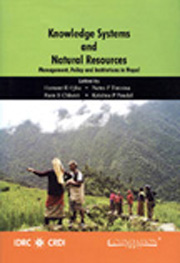Book contents
- Frontmatter
- Contents
- Preface
- Abbreviations
- Glossary of Nepali Words
- 1 Knowledge Systems and Deliberative Interface in Natural Resource Governance: An Overiew
- 2 Agricultural Technology Development in Nepal: Critical Assessment from Knowledge System Perspective
- 3 Contested Knowledge and Reconciliation in Nepal's Community Forestry: A Case of Forest Inventory Policy
- 4 From Grassroots to Policy Deliberation: The Case of Community Forest Users' Federation in Nepal
- 5 From Isolation to Interaction: Increasing Knowledge Interface in Chhattis Mauja Irrigation system in Nepal
- 6 Action Research Experience on Democratising Knowledge in Community Forestry in Nepal
- 7 Culturally Embedded Knowledge in Irrigation: People's Ways of Thriving in a Himalayan Village
- 8 Deliberative Knowledge Interface: Lessons and Policy Implications
- About the Contributors
6 - Action Research Experience on Democratising Knowledge in Community Forestry in Nepal
Published online by Cambridge University Press: 26 October 2011
- Frontmatter
- Contents
- Preface
- Abbreviations
- Glossary of Nepali Words
- 1 Knowledge Systems and Deliberative Interface in Natural Resource Governance: An Overiew
- 2 Agricultural Technology Development in Nepal: Critical Assessment from Knowledge System Perspective
- 3 Contested Knowledge and Reconciliation in Nepal's Community Forestry: A Case of Forest Inventory Policy
- 4 From Grassroots to Policy Deliberation: The Case of Community Forest Users' Federation in Nepal
- 5 From Isolation to Interaction: Increasing Knowledge Interface in Chhattis Mauja Irrigation system in Nepal
- 6 Action Research Experience on Democratising Knowledge in Community Forestry in Nepal
- 7 Culturally Embedded Knowledge in Irrigation: People's Ways of Thriving in a Himalayan Village
- 8 Deliberative Knowledge Interface: Lessons and Policy Implications
- About the Contributors
Summary
Introduction
Nepalese society has historically been socially, economically and culturally diverse and differentiated. However, the Hindu and patriarchal cultural production of knowledge has been dominant throughout the history and has created social inequities and injustice within the society that is manifested in unequal power relations, which are defined by caste, class, gender and regional settlement. These diversities have further created the islands of knowledge communities and value systems of those sections of the society. Poor, women, ethnic minorities and people of remote locations have historically been excluded from mainstream state politics, bureaucratic positions, and denied proportional representation by the government. In the process, feudal mindset and historically constructed social power has legitimised the knowledge of local elites (usually they are from rich and higher caste people) and bureaucrats in every aspects of social life including natural resource management.
In this broader context of the society, forests have been centrally managed by the state from late 1950s. So far the state and the forest bureaucrats have overly relied on the technical and colonial knowledge of forest management. The state has tried to protect the forest by alienating the people from it despite local people's indispensable dependence over the resources. However, the state could not protect the forest from encroachment, deforestation and resource depletion. Simultaneously, there were many successful cases of indigenous knowledge based forest management practices in the remote and rural parts of the country from the long past.
- Type
- Chapter
- Information
- Knowledge Systems and Natural ResourcesManagement, Policy, and Institutions in Nepal, pp. 110 - 134Publisher: Foundation BooksPrint publication year: 2007



